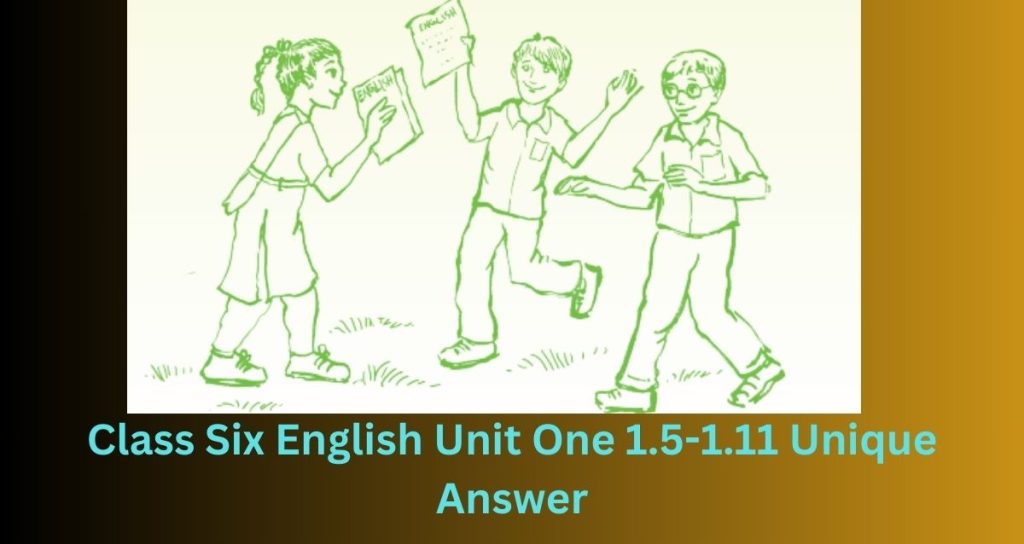
Class Six English Unit One 1.5-1.11 Unique Answer
Class Six English Unit One 1.5-1.11 Unique Answer is designed to help students improve their English speaking and listening skills. This unit teaches students how to communicate politely and effectively in everyday situations. Through fun activities and simple conversations, students will learn essential words and phrases they can use daily.
Students will practice basic greetings and polite expressions in the first section of Class Six English Unit One 1.5-1.11 Unique Answer. They will learn how to say “hello,” “thank you,” and “sorry” correctly and understand when to use these phrases. The unit also teaches students how to ask and answer questions politely. As students continue through the unit, they will engage in more detailed conversations that mimic real-life scenarios, such as talking to family members, friends, and teachers.
These exercises will help students feel more confident in speaking English and interacting with others. By the end of the unit, students will better understand how to communicate respectfully and effectively in English, making them more comfortable in various social situations.
To Know the answer to unit one, 1.1 to 1.4. Click here
Class Six English Unit One 1.5 Unique Answer
1.5 Guess the meanings of the following expressions in the
conversation and discuss with your peers:
(কথোপকথনের মধ্যে ব্যবহৃত নিচের প্রকাশভঙ্গি/বাচনভঙ্গিগুলোর (expressions) অর্থ
কি হতে পারে তা তোমরা বন্ধুদের সাথে আলোচনা করো।
| I didn’t get you | আমি তোমার কথা বুঝতে পারিনি। |
| I wondered if you might need any help. | আমি ভেবেছিলাম, তোমার কোনো সাহায্যের প্রয়োজন হবে কি না। |
| What’s up? | কি খবর? |
| You don’t say! | তুমি বলো না ! |
| I owe you one. | আমি তোমার কাছে কোন এক কারণে ঋণী। |
| Language Focus Everyday we talk to many people. Some of them are very close to us like our friends & family. We have an informal relationship with them. Also, some of them are not so close to us (e.g. our Head Teacher) and some of them could be our new acquaintances. We have a formal relationship with them. While talking to the close ones, we use informal language and while talking to unknown or elderly people, we usually use formal language ভাষা ফোকাস প্রতিদিন আমরা অনেকের সাথে কথা বলি। তাদের কেউ কেউ আমাদের মতো আমাদের খুব কাছের বন্ধু এবং পরিবার। তাদের সঙ্গে আমাদের অনানুষ্ঠানিক সম্পর্ক রয়েছে। এছাড়াও, তাদের মধ্যে কিছু আমাদের খুব কাছের নয় (যেমন আমাদের প্রধান শিক্ষক) এবং তাদের মধ্যে কেউ কেউ হতে পারে আমাদের নতুন পরিচিতি। তাদের সঙ্গে আমাদের আনুষ্ঠানিক সম্পর্ক রয়েছে। কথা বলার সময় কাছের মানুষদের কাছে, আমরা অনানুষ্ঠানিক ভাষা ব্যবহার করি এবং অপরিচিতদের অথবা বা বয়স্ক মানুষের সাথে কথা বলার সময় , আমরা সাধারণত আনুষ্ঠানিক ভাষা ব্যবহার করি। |
Class Six English Unit One 1.6 Unique Answer
1.6 Read the expressions given in the table. Then, categorize them as
formal or informal expressions in the table:
(নিচের table এ দেওয়া প্রকাশভঙ্গিসমূহ (expressions) পড়ো। তারপর সারণিতে
formal এবং informal expression গুলো সাজাও।
(a) Hello! Good afternoon. (b) Need any help? (c) You can wait inside if you
want! (d) Hi, what’s up? (e) The pleasure is all mine, (f) Good day! (g) Say hello
to … (h) May I help you?
| Formal Expressions | Informal Expressions |
| (a) Hello! Good afternoon. (h) May I help you? (e) The pleasure is all mine, (f) Good day! | (b) Need any help? (c) You can wait inside if you want! (d) Hi, what’s up? (g) Say hello to |
Class Six English Unit One 1.7 Unique Answer
1.7 In pairs, make a short conversation on the given situation and act
it out.
(জোড়ায় প্রদত্ত পরিস্থিতির উপর একটি সংক্ষিপ্ত কথোপকথন তৈরি করো এবং তা অভিনয়
করে দেখাও।
Imagine that Silvia, one of your friends, had to go to the village home because her
school was closed due to the Corona situation. Now the face-to-face classes have
started, and Silvia needs help in English and Mathematics. Write a short conversation
offering your help ( কল্পনা করো যে তোমার এক বন্ধ সিল্ভিয়া, তাকে গ্রামের বাড়িতে যেতে হয়েছিল কারণ তার
করোনা পরিস্থিতির কারণে স্কুল বন্ধ। এখন মুখোমুখি ক্লাস
শুরু হয়েছে, এবং সিলভিয়ার ইংরেজি এবং গণিতে সাহায্য দরকার। তোমার সাহায্যের প্রস্তাব দিয়ে একটি ছোট কথোপকথন লিখ )
Answer:—————-
You:Hi Silvia, I heard you’re back from the village home. How was it there?
Silvia: Hi! It was okay, but I’m worried about catching up with my English and Math classes. I missed a lot of lessons when the school was closed.
You: Don’t worry; I can help you with that! We can meet after school and go through the lessons together. I can explain the topics in a simple, easy-to-understand way.
Silvia: Oh, that would be great! Thank you so much for offering to help. I need to catch up on those subjects.
You:No problem at all. We’ll make sure you’re back on track in no time!
Class Six English Unit One 1.8 Unique Answer
1.8 Read the conversations and identify the features of formal and
informal conversation in pairs.
(কথোপকথনটি পড়ো এবং জোড়ায় formal এবং informal কথোপকথনের
বৈশিষ্টট্যগুলো লেখো।
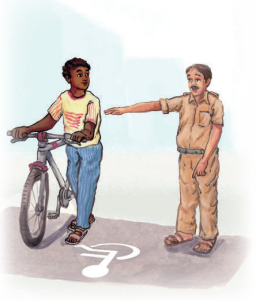
Situation 3:
A conversation between a parking
guard, Salam, and a Kenyan student,
Ali, who is studying at Dhaka
University, about the parking of a
bicycle. It goes like this: (
পরিস্থিতি 3:
পার্কিং পাহাড়াদার সালাম, এবং ঢাকায় বিশ্ববিদ্যালয়ে
অধ্যয়নরত কেনিয়ার একজন ছাত্র আলীর মধ্যে বাইসাইকেলের পার্কিং নিয়ে কথোপকথন।
কথোপকথনটি এইরকম
| Conservation | Meaning |
| Salam: Hey, you’re parking wrong! Ali: Sorry? Salam: You shouldn’t park your bicycle here. This place is for people with disabilities (pointing to the sign) Ali: Oh okay, didn’t notice that! I’ll place it somewhere else. Salam:That’s all right, just park it right next time. Ali: I’ll keep that in mind. Have a good day. Salam: You too. | সালাম:আরে, আপনি ভুল পার্কিং করছেন! আলী: দুঃখিত? সালাম: এখানে আপনার সাইকেল পার্ক করা উচিত নয়। এই জায়গাটি প্রতিবন্ধী ব্যক্তিদের জন্য (চিহ্নের দিকে ইশারা করে) আলী: ওহ ঠিক আছে, খেয়াল করিনি! আমি এটি অন্য কোথাও রাখব। সালাম: ঠিক আছে, পরের বার ঠিক ডান দিকে পার্ক করুন। আলী: আমি এটা মাথায় রাখব। আপনার দিনটি শুভ হোক. সালাম: আপনিও। |
N.B: This is an example of a casual conversation between Salam and Ali.
The guard is only doing his duty and Ali does what is right. And in the end,
Ali thanks Salam as he is just doing his duty.
এটা সালাম এবং আলীর মধ্যে সাধারন কথোপকথন।
পাহাড়াদারটি শুধু তার কর্তব্য পালন করেছে এবং আলী যেটা সঠিক সেটা করেছে।
আলী সালামকে ধন্যবাদ জানায় যেহেতু সে তার দায়িত্ব পালন করছে
Situation-4
A conversation between a student and his school gardener( একজন ছাত্র এবং তার স্কুলের মালীর সাথে কথোপকথন।
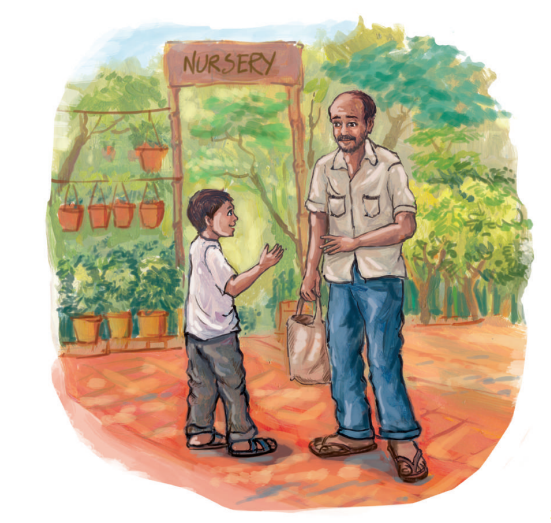
Hasib is a student at a high school. He meets Jalal, the gardener of his school, outside
the school. Though Jalaluddin does not recognize him, Hasib does. The conversation
between them goes something like this:
হাসিব একটি উচ্চ বিদ্যালয়ের ছাত্র।স্কুলের বাইরে তার স্কুলের মালী জালালের সাথে তার দেখা হয়
. জালালউদ্দিন তাকে চিনতে না পারলেও হাসিব চিনতে পারে।
তাদের মধ্যে কথোপকথোন এইভাবে চলেঃ
| Conservations | Meaning |
| Hasib: Hi Mali chacha! How are you? (Informal greeting) Jalal: I am fine. Thank you. [Answering questions even to strangers is a nice thing. Make sure to thank them if they compliment you or ask about your well-being, but try to avoid counter-questions if possible] Hasib: Where are you going? Jalal: I’m sorry, I think you mistook me for someone else. Umm…Do I know you? [Politely stating that he does not recognize Hasib.] Hasib: Don’t say you didn’t recognize me!! [ Indicates that these two know each other and they have informal relation] Jalal: You seem familiar. Where do I know you from? Hasib: Come on, Jalal! I am from your school. Remember how I asked you about gardening just the other week? [ Again, signifies the informal relation] Jalal: How forgetful of me! You are Hasib if I remember you correctly. Guess I am getting old! (Laughing) Hasib: Yes, you are. (Laughing) Jalal: I am just going to the nursery to purchase some flower plants. Hasib: For the school, I guess. Jalal: Yes, indeed. Hasib: I mustn’t hold you back then. See you later, uncle. Jalal: See you. [N.B: Here Hasib is controlling the direction of the conversation. He is the conversation initiator. He is joking during the conversation which signifies an informal/friendly relation with a much older gardener. | হাসিব: ওহে মালি চাচা! আপনি কেমন আছেন? (অনুষ্ঠানিক শুভেচ্ছা) জালাল: ভালো আছি। ধন্যবাদ । [ এমনকি অপরিচিতদের প্রশ্নের উত্তর দেওয়া একটি চমৎকার জিনিস। যদি তারা তোমাকে প্রশংসা করে বা তোমার স্বাস্থ্য সম্পর্কে জিজ্ঞাসা করে তবে তাদের ধন্যবাদ জানাতে ভুলবে না , কিন্তু যদি সম্ভব হয় পাল্টা প্রশ্ন এড়াতে চেষ্টা করো ] হাসিব:কোথায় যাচ্ছ? জালাল:আমি দুঃখিত, আমি মনে করি তুমি আমাকে অন্য কেউ ভেবে ভুল করেছ । উম…আমি কি তোমাকে চিনি? [ বিনয়ের সাথে জানায় যে যে তিনি হাসিবকে চিনতে পারছেন না।] হাসিবঃ আমাকে চিনতে পারেননি এ কথা বলবেন না !! [ ইঙ্গিত করে যে এই দুইজন একে অপরকে জানে এবং তাদের মাঝে অনানুষ্ঠানিক সম্পর্ক আছে ] জালাল: আপনি পরিচিত মনে হচ্ছে. আমি তোমাকে কোথা থেকে চিনি? হাসিব: আরে জালাল! আমি আপনার স্কুল থেকে এসেছি। মনে করেন, অন্য সপ্তাহের বাগান করা সম্পর্কে আমি আপনাকে কিভাবে জিজ্ঞাসা করেছি ? [ আবার, অনানুষ্ঠানিক সম্পর্ককে বোঝায় ] জালাল:আমি কতই না ভোলা ! আমি মনে করতে পারছি তুমি হাসিব। চিন্তা করো আমি বৃদ্ধ হচ্ছি! (হাস্যময়) হাসিব: হ্যাঁ, আপনি। (হাস্যময়) জালাল: আমি কিছু ফুলের চারা কিনতে নার্সারিতে যাচ্ছি। হাসিব: স্কুলের জন্য, আমার ধারণা। জালাল: হ্যাঁ, সত্যিই। হাসিব:তাহলে আপনাকে আর ধরে রাখব না। পরে দেখা হবে চাচা। জালাল: দেখা হবে। এখানে হাসিব কথোপকথনের দিক নিয়ন্ত্রণ করছে। তিনি কথোপকথনের সূচনাকারী। কথোপকথনের সময় তিনি ঠাট্টা করছে যা একটি অনেক বয়স্ক মালীর সাথে অনানুষ্ঠানিক/বন্ধুত্বপূর্ণ সম্পর্ক বোঝায় । |
Situation 5:
Meeting your class
teacher in a shopping mal
(তোমার শ্রেণী শিক্ষকের সাথে শপিং মলে সাক্ষাৎ)
Jahid meets his class teacher Ms. Shakina in a shopping mall. The conversation they
have is somewhat like this( জাহিদ তার ক্লাস শিক্ষিকা শাকিনার সাথে একটি শপিং মলে দেখা করে। তাদের কথোপকথন কিছুটা এরকম)
| Jahid: Hello, Ma’am! (Formal greeting) Ms. Shakina: Hey, Jahid! How are you? (Informal greeting) Jahid: I’m fine, Ma’am. I hope you are also fine. [NB: Avoidance of direct question, as asking direct questions can be perceived as impolite in some situations] Ms. Shakina: I’m fine too. Shopping for the winter, I guess? [NB: asking direct questions such as ‘Why are you here?’ is impolite in some situations] Jahid:Yes, Ma’am. Ms. Shakina: Me too. [NB: Teacher is giving the answers unasked] Are you with your parents? Jahid:No, Ma’am. I’m with my uncle. Ms. Shakina: Give my regards to your parent Jahid: Of course, Ma’am. Ms. Shakina:Well, enjoy your shopping. Jahid: Thank you, Ma’am. You too enjoy your shopping. [NB: Avoid saying only “you too” as it is not very formal] Ms. Shakina: See you later. Jahid: Yes, Ma’am. [NB: Avoid saying something like “see you” as it is not formal | জাহিদ: হ্যালো ম্যাডাম! (আনুষ্ঠানিক অভিবাদন) মিস সাকিনা: আরে জাহিদ! তুমি কেমন আছো? (অনুষ্ঠানিক শুভেচ্ছা) জাহিদ: ভালো আছি ম্যাডাম। আশা করি আপনিও ভালো আছেন। [NB: সরাসরি প্রশ্ন এড়ানো, কিছু পরিস্থিতিতে সরাসরি প্রশ্ন জিজ্ঞাসা করা অভদ্রতার ধারণা হতে পারে] মিসেস শাকিনা:আমিও ভালো আছি। আমার অনুমান, শীতের কেনাকাটা করার জন্য এসেছ। [NB: কিছু পরিস্থিতিতেসরাসরি প্রশ্ন জিজ্ঞাসা যেমন ‘আপনি এখানে কেন?’ অভদ্রতা] জাহিদ:হ্যাঁ ম্যাডাম। মিসেস শাকিনা: আমিও। [NB: শিক্ষককে প্রশ্ন না করেই উত্তর দিচ্ছেন] তুমি কি বাবা-মার সাথে এসেছ? জাহিদঃ না ম্যাডাম। আমি আমার চাচার সাথে এসেছি। মিসেস শাকিনা: তোমার পিতামাতাকে আমার সালাম জানাইয়ো। জাহিদ: অবশ্যই ম্যাডাম। মিস শাকিনা: আচ্ছা, তোমার কেনাকাটা উপভোগ করো। জাহিদ: ধন্যবাদ, ম্যাডাম। আপনিও আপনার কেনাকাটা উপভোগ করুন। [NB: শুধুমাত্র “আপনিও” বলা এড়িয়ে চলুন কারণ এটি খুব আনুষ্ঠানিকতা নয়] মিসেস শাকিনা: পরে দেখা হবে। জাহিদ:জ্বি, ম্যাডাম। [NB: “দেখা হবে” বলা থেকে বিরত থাকো কেন না এটা আনুষ্ঠানিকতা নয়। |
[N.B: Here Ms. Shakina is controlling the direction of the conversation. In
a formal situation like this one, when one will talk to someone elderly, one
should not speak until spoken to, and only answer what is asked and should
not ask counter questions] এখানে মিস শাকিনা কথোপকথনের দিক নিয়ন্ত্রণ করছেন। ভিতরে
এই ধরনের একটি আনুষ্ঠানিক পরিস্থিতিতে, যখন কেউ একজন বয়স্ক কারো সাথে কথা বলবে, একজনের
কথা বলা শেষ না হওয়া পর্যন্ত কথা বলা উচিত নয়, এবং শুধু যা জিজ্ঞাসা করা হয়েছে তার উত্তর
দেয়া উচিত ।]
Class Six English Unit One 1.9 Unique Answer
Read the conversations and write appropriate responses in the
blanks (কথোপকথনগুলো পড়ো এবং খালি ঘরে সঠিক উত্তর লেখ।)
a) Hey Delowar! Don’t sit here. These seats are reserved for women
Answer- Delowar: Oh, I didn’t notice the sign. Thanks for letting me know. I’ll move right away.
b) Don’t break the line. Always stand in a queue
Answer-Oh, sorry about that. I didn’t realize there was a queue.
c) Your face says you don’t remember me. We were classmates.
Answer- Oh? I’m sorry, I’m having trouble placing you
d) d) Hello, son! How are you?
Answer- Hi, Mom/Dad! I’m doing well, thanks. How about you?
e) Sorry friend, I’m getting late. I need to go.
Class Six English Unit One 1.10 Unique Answer
Read the conversations again and write ‘T’ for true sentences
and ‘F’ for false sentences. One is done for you.
(কথোপকথনগুলো পড়ো এবং সত্য হলে T এবং মিথ্যা হলে F লেখো। একটি তোমার জন্য
করে দেওয়া হলো-
a. You must greet and give thanks when you talk to seniors. T
b. “Hi! How are you?”- is an informal greeting. T
c. You should not ask a personal question to elderly people. T
d. “Come on, dear!”- is a formal expression. F
e. You should always thank when someone does a favor to you. T
Class Six English Unit One 1.11 Unique Answer
1.11 Work in pairs/ groups. Make short conversations on the
situations given in the illustrations.
(জোড়ায়/ দলে কাজ করো। নিচের ছবিগুলো অনুযায়ী ছোট/ সংক্ষিপ্ত কথোপকথন (conversation) তৈরি করো।)

Boy: Hello, Grandpa!
Grandpa: Hello, my dear! How are you?
Boy: I am fine, Grandpa. How are you?
Grandpa: I am good, thank you. Did you have fun today?
Boy: Yes, I did. I played with my friends.
Grandpa: That’s great to hear. Always have fun and learn new things.
Boy: Yes, Grandpa. I will!
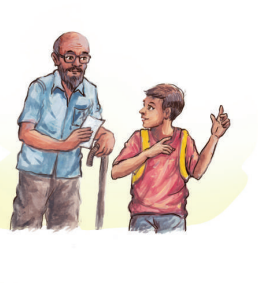
Boy: Hi, Uncle! How are you?
Uncle: Hello, my boy! I am fine, thank you. Where are you going?
Boy: I am going to school.
Uncle: Have a good day at school!
Boy: Thank you, Uncle! See you later!
Uncle: See you later, take care!
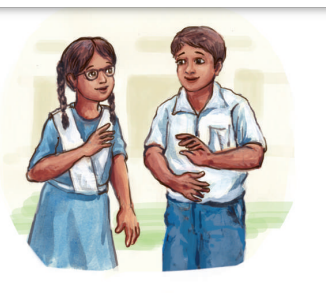
Girl: Hi! I’m good, thank you. How are you?
Boy: I’m good too. Did you finish your homework?
Girl: Yes, I did. Did you?
Boy: Yes, I finished it too. Are you ready for the test?
Girl: Yes, I studied a lot. Good luck!
Boy: Good luck to you too!
New Words
| English Word | Bengali Meaning |
|---|---|
| appreciate | প্রশংসা করা |
| elderly | বয়স্ক |
| conversation | আলাপ |
| direction | দিকনির্দেশনা |
| later | পরে |
| relationship | সম্পর্ক |
| acquaintance | পরিচিত |
| parking | গাড়ি রাখার স্থান |
| guard | প্রহরী |
| disability | অক্ষমতা |
| gardener | মালী |
| recognize | চিনতে পারা |
| stranger | অচেনা ব্যক্তি |
| compliment | প্রশংসা |
| well-being | কল্যাণ |
| avoid | এড়িয়ে চলা |
| mistake | ভুল |
| indicate | নির্দেশ করা |
| relation | সম্পর্ক |
| seem | মনে হওয়া |
| familiar | পরিচিত |
| signify | চিহ্নিত করা |
| forgetful | ভুলোমনা |
| nursery | নার্সারি |
| purchase | ক্রয় |
| guess | অনুমান করা |
| indeed | প্রকৃতপক্ষে |
| initiator | উদ্যোক্তা |
| shopping mall | বিপণি-বিতান |
| perceived | উপলব্ধ |
| impolite | অশিষ্ট |
| of course | নিশ্চয়ই |
| reserve | সংরক্ষণ করা |
| queue | সারি |
In conclusion, Class Six English Unit One 1.5-1.11 Unique Answer provides a comprehensive foundation for students to develop their language skills effectively. This unit focuses on essential aspects such as greetings, expressions of gratitude, and understanding formal and informal communication. By mastering these basics, students can improve their ability to interact respectfully and appropriately in various social situations.
Class Six English Unit One 1.5-1.11 unique answer also emphasizes the importance of politeness and proper etiquette, which are crucial for building good relationships and fostering a positive learning environment. The lessons and exercises within this unit are designed to be engaging and informative, ensuring that students grasp these fundamental concepts thoroughly. The skills acquired in Class Six English Unit One 1.5-1.11 will be a valuable foundation for future language learning and effective communication.
